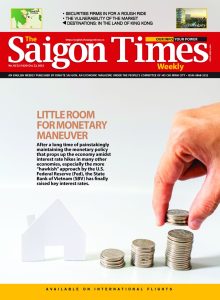Stabilizing the commodity market and consumer sentiment is of paramount importance to growth and consumption. The recent past saw long queues of people at gas stations as supply fell short, which triggered worries about fuel market chaos. The phenomenon, however, offers an insight into macro-economic management inadequacies.
The phenomenon of a fuel scarcity that culminated in long queues of people at gas stations might be deemed a momentary issue, but indeed it stems from three major reasons and can repeat itself in the future if no remedial measures are taken.
Price control kills business
The amended fuel trading management policy began taking effect in early 2022, but the regulations on fixed business costs as a constituent of the gasoline price that are seen as the biggest bottleneck were not adjusted. The fixed business costs lead to extremely low or no discounts for retailers, prompting many of them to barely maintain business as the low discount cannot compensate for operation expenses.
The price control policy is understood as a tool to help supply fuels at low prices, supporting people’s livelihoods and underpinning production and services as fuels are essential for the economy. However, when prices fail to comply with the supply and demand rule and revenues are not enough to cover costs or if the profit margin is too thin for suppliers, then the policy would kill business.
With the price set far lower than expected, wholesalers tend to supply a volume that is smaller their capacity. Meanwhile, lower prices prompt consumers to buy more fuel than they should when prices correspond to the real demand. These two conflicting forces lead to the shortage that does not result from a scarcity, but from the choices of producers, suppliers and consumers due to the price control policy.
Fuel oligopoly
Under the prevailing regulations, a retail firm can only serve as an outlet for just one general sales agent. Meanwhile, the supply side is dominated by a small number of companies, with Petrolimex alone holding a market share of 50%. Therefore, the fuel supply side can be characterized as oligopoly. This monopoly remains solid as the energy sector requires intervention and adjustment by the State, just like the electricity sector. The oligopoly and restrictive regulations are stripping retailers of choices when undersupplied, resulting in a momentary shortage of fuels.
Currently, Petrolimex seems to be leading the market, guiding the fuel price and determining the supply. However, Petrolimex and other peers are for-profit businesses that pursue their own strategies for making the most income out of the lowest cost possible, including their maneuvers to limit supply – both imported and distributed volumes – at any time when prices are not good for them.
The limited number of suppliers is limiting competition. Monopolistic enterprises have the free hand to calculate the supply suitable to their business strategies. If more enterprises join the supply side, the market competition would be enhanced, ensuring an equilibrium in both supplies and prices, bringing about the highest possible profits for suppliers and efficiently meeting the demand of consumers. However, as State agencies want to proactively control prices and supplies for easy management in the fuel sector, the entry hurdles remain high for new enterprises, which hinders the efficiency of the market and causes damage to society.
Herd mentality behind the shortage
The phenomenon of crowds of consumers flooding gas stations leads to the consumption far exceeding the actual demand, which was also a factor behind the chaotic market recently. In microeconomics, this phenomenon can be termed as a trendy effect. For ordinary goods, enterprises can seek to create trendy effects for their products to capture consumer attention and boost sales. The recent images of certain gas stations displaying signs to announce their temporary closure triggered worries that a fuel undersupply was imminent. Instead of purchasing fuels enough for their use, many consumers demanded higher volumes to hedge against a scarcity. This situation pushed the demand multiple times higher than the real usage.
Worse still, the consumers panic spread quickly via words of mouth, which amplified the demand while the supply stayed limited or even decreased slightly due to reasons mentioned above.

Risk prevention
For essential products and services that play an important role in socio-economic development such as energy (fuel and electricity), food, education and healthcare, the State often intervenes to control prices and supplies to ensure easy public access. However, this intervention unintentionally damages the supply and demand balance, adversely affecting the market-economy efficiency and giving way to repeated chaotic ruptures. The better approach to ensure people’s access on one hand and to enhance the efficiency of the market economy is to build up a database on prices, supply and demand to diffuse information to stakeholders. This approach helps improve the market connectivity to align supply to demand, and anticipate the future demand for efficient preparedness.
When making policies regarding price management, regulators need to assess both the profitability of enterprises and the ability of consumers to pay. However, it is impossible to set a price that satisfies all stakeholders. Therefore, instead of setting the lowest possible price, the State should have support policies for underprivileged groups so as not to distort the market price and thus annihilate business momentum.
As the economy is growing faster and given rapid changes in the market, it is imperative to review demands and properties of the supply-demand balance to come up with suitable macroeconomic management tools. For the fuel market, it is suggested that entry hurdles be lowered for more enterprises so as to boost competition, as this is one of the important solutions to boost the efficiency of the energy sector.
(*) Senior expert on economy and policy – International consulting firm enCity









